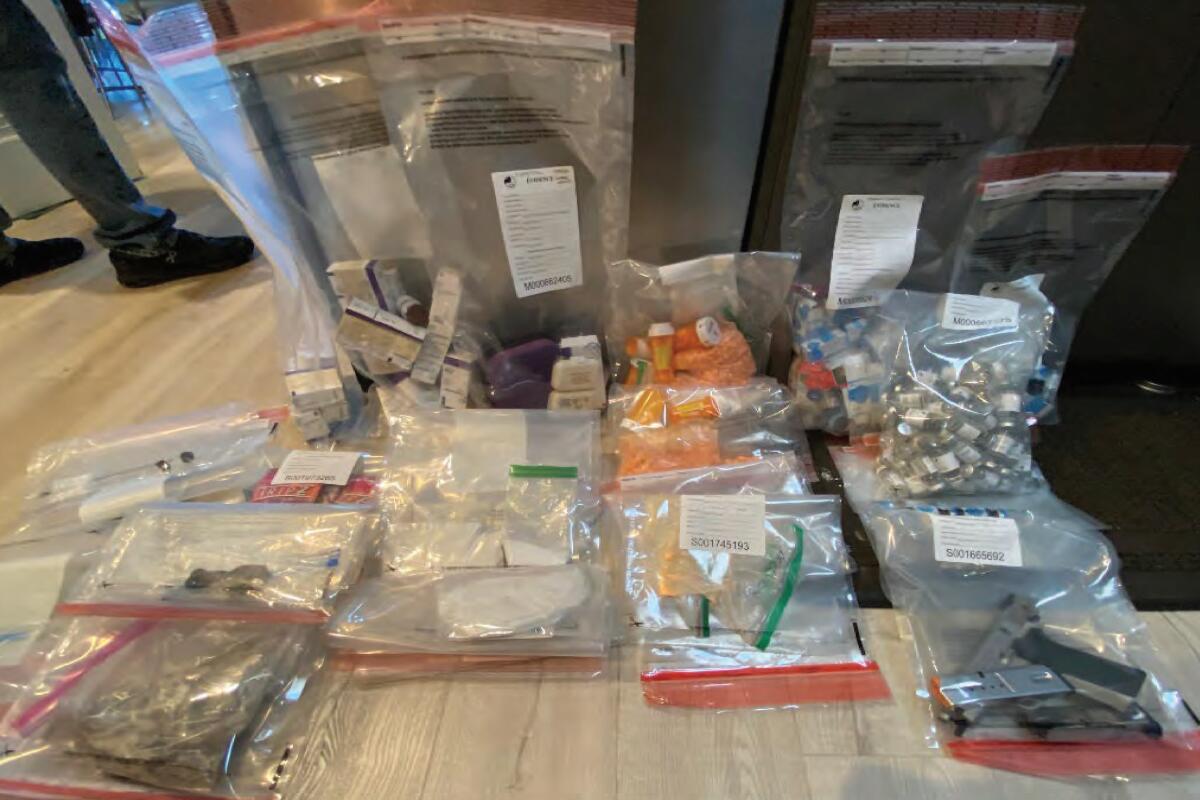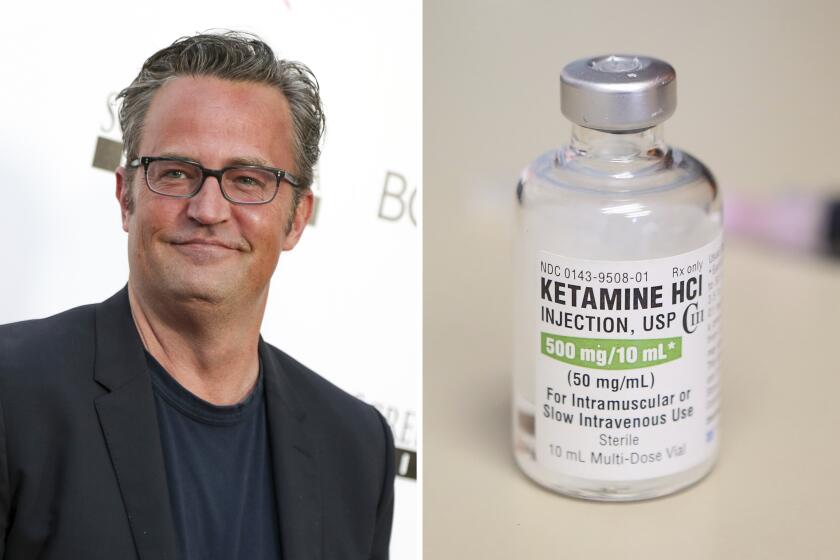L.A.’s ‘Ketamine Queen’ lived a celebrity-studded life. Now she’s been charged in Matthew Perry’s death

On social media, Jasveen Sangha offered herself up as an L.A. power player — rubbing elbows with celebrities, sporting fashionable attire and jetting across the globe on lavish vacations.
She posed for Instagram photos with actor Charlie Sheen and Perla Hudson, the ex-wife of Guns N’ Roses guitarist Slash. Social media posts show luxurious trips to Tokyo and a resort in Playa del Carmen, Mexico, complete with pre-flight caviar at the PS luxury travel lounge at Los Angeles International Airport.
To celebrate her 40th birthday, Sangha hosted a posh Players Ball-themed party at Kiss Kiss Bang Bang, a lounge in Koreatown. Dressed in a head-to-toe pink outfit adorned with sparkles and feathers, she posed with guests on a makeshift red carpet.
“The eyes are useless when the mind is blind,” she wrote on her Instagram.
It’s hard to know how close Sangha actually is to the celebrities who appeared on her social media. Sheen and Hudson could not be reached for comment.
Federal prosecutors allege that Sangha operated a narcotics business so lucrative she was known to customers as the “ketamine queen.”

She is now one of five people charged in a conspiracy to distribute ketamine to Matthew Perry, who died last fall from acute effects of the drug.
Authorities allege in an indictment filed in court that Sangha supplied the ketamine the “Friends” actor injected on the day of his death — and that she for years sold drugs out of her North Hollywood apartment, which was nicknamed the “Sangha stash house.”
Sangha has pleaded not guilty. If convicted, the 41-year-old could face up to life in prison.
Federal authorities have filed drug charges against five individuals, including two doctors, in connection with the death of ‘Friends’ star Matthew Perry.
Prosecutors filed a brief in court seeking to hold Sangha without bail, alleging that “given the volume of drugs defendant sold there are likely more victims.” The U.S. attorney’s office declined to answer additional questions about the investigation other than to say it is ongoing.
Law enforcement sources who spoke on the condition of anonymity said investigators are trying to determine if any other overdose deaths can be tied to drugs Sangha allegedly supplied.
Her attorney did not respond to a request for comment from The Times. But lawyer Mark Geragos, whose firm is representing Sangha, questioned during an interview with News Nation how authorities know who supplied the fatal dose of ketamine to Perry.
“I’ve never seen a pathologist yet who’s going to be able to say, ‘I’m going to do an autopsy and I’m going to trace back where these drugs came from.’ They can’t do that. It’s a tragedy all the way around, but just because it’s a tragedy doesn’t mean it’s criminal,” Geragos told the outlet.
In an affidavit, a U.S. Drug Enforcement Administration agent described Sangha as a “high-volume dealer” who kept “handwritten notes that appeared to detail thousands of dollars of drug transactions.” In multiple chat threads with clients on encrypted messaging apps, she used coded language for drug transactions, according to the agent.
She referred to her supplier as the “master chef” or the “scientist,” prosecutors wrote in court papers. Her electronic devices included saved videos of her cooking liquid ketamine on a stovetop to convert it to powder, prosecutors say.
Ketamine is typically used as an anesthetic but has grown in popularity over the last decade as a therapeutic treatment for certain mental health diagnoses, including post-traumatic stress disorder and depression. The drug, known in the party scene as “Special K,” has simultaneously become much more sought-after for recreational purposes, said Dr. Wesley Ryan, who administers ketamine as part of his Marina del Rey psychiatric practice.
“I have certainly seen that tons more people now are using ketamine than were five or 10 years ago,” he said. “It’s bizarre because it’s a sedative, but it kind of replaced cocaine in a party setting.”
Some people snort or inject the drug to experience euphoric or “dissociative” effects that cause them to feel separated from their bodies, experts say. At very high doses, ketamine can make people feel immobilized and spur hallucinations, but it also carries the risk of complicating breathing and increasing demands on the heart.

Prosecutors allege in court records that Sangha held “herself out as a celebrity drug dealer with high-quality goods,” ranging from methamphetamine to magic mushrooms. But ketamine was allegedly her specialty.
Perry, who had become addicted to intravenous ketamine, started purchasing the powerful drug from a Southern California doctor in late September, according to the indictment and law enforcement officials. Around mid-October, Perry reached out to an acquaintance, Erik Fleming, who authorities alleged in the indictment sourced a supply of ketamine from Sangha. Over the course of less than a month, Fleming and Sangha sold about 50 vials of the drug to the actor for about $11,000, according to prosecutors.
Sheen’s ex-wife, Brooke Mueller, played a key role in the investigation by volunteering vital information to detectives after Perry’s death that linked Sangha and Fleming to the case, according to law enforcement sources not authorized to discuss the investigation.
Prosecutors allege Sangha knew the dangers of ketamine. In August 2019, she allegedly sold the drug to another man, Cody McLaury, before he overdosed, according to court papers. One of McLaury’s family members later sent her a text saying the ketamine had resulted in his death.
After receiving the text, prosecutors say, she conducted a Google search: “Can ketamine be listed as a cause of death?”
In announcing arrests in the death of “Friends” star Matthew Perry, authorities unveiled a disturbing narrative of the weeks leading up to his final day.
Perry was found dead in a hot tub at his Los Angeles home on Oct. 28. Authorities later determined he had died from acute effects of ketamine.
When Sangha learned of Perry’s death, she immediately tried to distance herself from the situation, according to prosecutors. She used an encrypted communication app to call Fleming to discuss “distancing themselves from selling ketamine” to Perry, the indictment alleged, noting that she followed up with a text on the app: “Delete all our messages.”
Less than a month later, Sangha took a vacation to Tokyo, where she had afternoon tea and sipped on a lychee martini at a luxury hotel overlooking the city.
Sangha had previously been arrested in March in a separate federal drug case in which she was accused of participating in a drug trafficking operation, court records show. During a search of her apartment that month, federal agents and detectives with the Los Angeles Police Department say they found approximately 79 vials of ketamine, more than three pounds of orange pills containing methamphetamine, psilocybin mushrooms, cocaine, and prescription drugs that appeared to be fraudulently obtained.
They also found a money counter, a scale covered in drug residue, a signal and hidden camera detector, and a green journal with handwritten notes detailing thousands of dollars in drug transactions, prosecutors wrote in a brief filed in court.
Sangha, who has dual citizenship in the United States and the United Kingdom, was released from custody in that case after posting a $100,000 bond and surrendering her passport, according to court records.
One of Sangha’s neighbors, who spoke to The Times on condition of anonymity, said agents carried away about 20 boxes from the modern apartment complex during the search.
Another neighbor, who identified herself only as Kelly, moved into the building earlier this year and described the tenants as a mix of families and working professionals. In the days after Sangha’s charges were announced, news vans and reporters staked out the sidewalk outside, Kelly said.
“Anything that has to do with a celebrity is going to get attention,” Kelly said, adding that the circumstances surrounding the case didn’t surprise her.
After federal authorities announced charges against a medical professional allegedly linked to the death of actor Matthew Perry, the popular drug ketamine faces new scrutiny.
Sangha graduated from Calabasas High School in 2001. She posed for her senior portrait wearing a red turtleneck sweater and a stoic expression. A portion of her senior quote read: “It isn’t what they say about you, it’s what they whisper.”
She went on to attend UC Irvine, graduating in 2005 with a bachelor’s degree in social sciences, according to the university. On Instagram, she said she received an MBA from Hult International Business School in 2010, though the school did not reply to a Times inquiry for confirmation.
By 2017, she was part owner of a nail salon called Stiletto Nail Bar in Studio City. But she and her partner ended up being booted from the business for not paying their rent, their landlord wrote in court records.
All of their equipment and supplies remained inside, according to a civil suit Sangha filed. The case was later dismissed and settled out of court.
Though she represented herself as an events curator on social media, prosecutors wrote in court records that Sangha has been unemployed since at least 2019. Still, they note in court papers, she could afford rent on her North Hollywood apartment, which was listed online for more than $3,000 a month.
When authorities began investigating her, she drove a rented Range Rover. Later, she upgraded to a 2024 BMW, prosecutors wrote in the court filing.
Clancy Carter, a friend of Sangha’s, told the Daily Mail that the two had attended Golden Globes and Oscars ceremonies together, and she believed Sangha worked in marketing and event planning for celebrities. Carter declined to comment further when reached by The Times.
“She’s always in the nicest designer clothes. She has a family that takes care of her,” Carter told the paper. “She has never been the type of person who needed money.”
Times librarians Cary Schneider and Scott Wilson contributed to this report.
More to Read
Subscriber Exclusive Alert
If you're an L.A. Times subscriber, you can sign up to get alerts about early or entirely exclusive content.
You may occasionally receive promotional content from the Los Angeles Times.

















